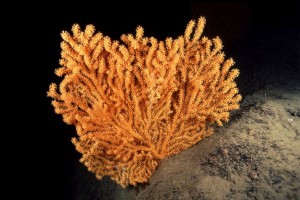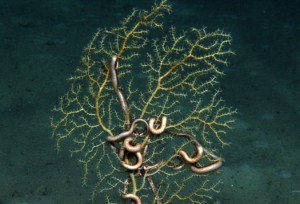
 Deepwater coral reefs, aptly known as cold-water coral reefs, can be formed by the carbon created when bacteria biodegrade oil from natural seeps nearby. Oil spills can be easily devastating to coral reefs, ranging from the reefs at the surface of the water, directly subsurface, and even cold-water corals. The most recent and notable offshore drilling incident was the BP Deepwater Horizon oil spill which was responsible for releasing millions of barrels of oil into the Gulf of Mexico and the surrounding coast. Researchers have noticed that the cold-water coral population has been greatly impacted by this recent incident within the deeper depths of the Gulf of Mexico.
Deepwater coral reefs, aptly known as cold-water coral reefs, can be formed by the carbon created when bacteria biodegrade oil from natural seeps nearby. Oil spills can be easily devastating to coral reefs, ranging from the reefs at the surface of the water, directly subsurface, and even cold-water corals. The most recent and notable offshore drilling incident was the BP Deepwater Horizon oil spill which was responsible for releasing millions of barrels of oil into the Gulf of Mexico and the surrounding coast. Researchers have noticed that the cold-water coral population has been greatly impacted by this recent incident within the deeper depths of the Gulf of Mexico.
Students will be creating an oil spill on ‘cold-water corals’ (cotton candy) and observing which oil does the most damage. Water, syrup, and honey are supposed to imitate the viscosity of a light crude oil, intermediate fuel oil, and a heavy fuel oil. All are devastating to marine environments, but in different ways. Lighter oils are more toxic and expansive, while heavier oils do not spread as quickly, but are able to smother anything many things.
The full-lesson plan is available here: http://cwc.lumcon.edu/wp-content/uploads/2012/09/Coating-Deepwater-Coral-with-Sweets.pdf
